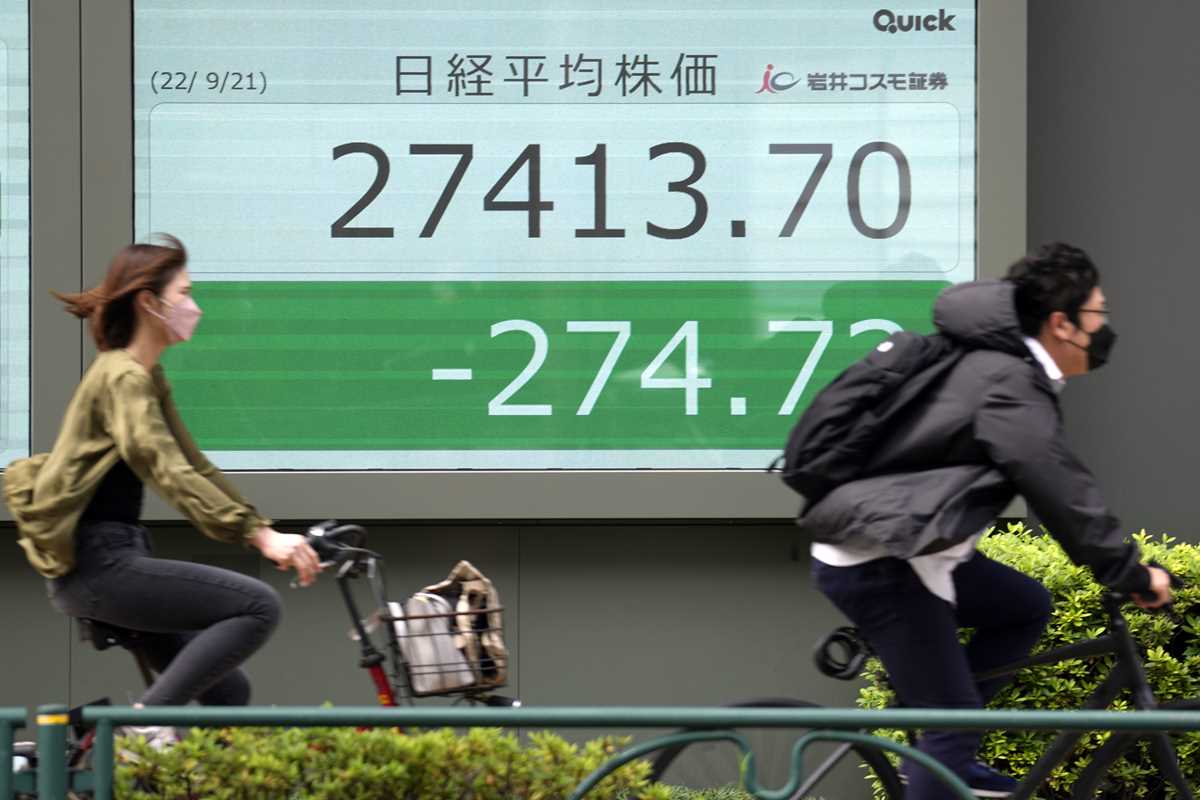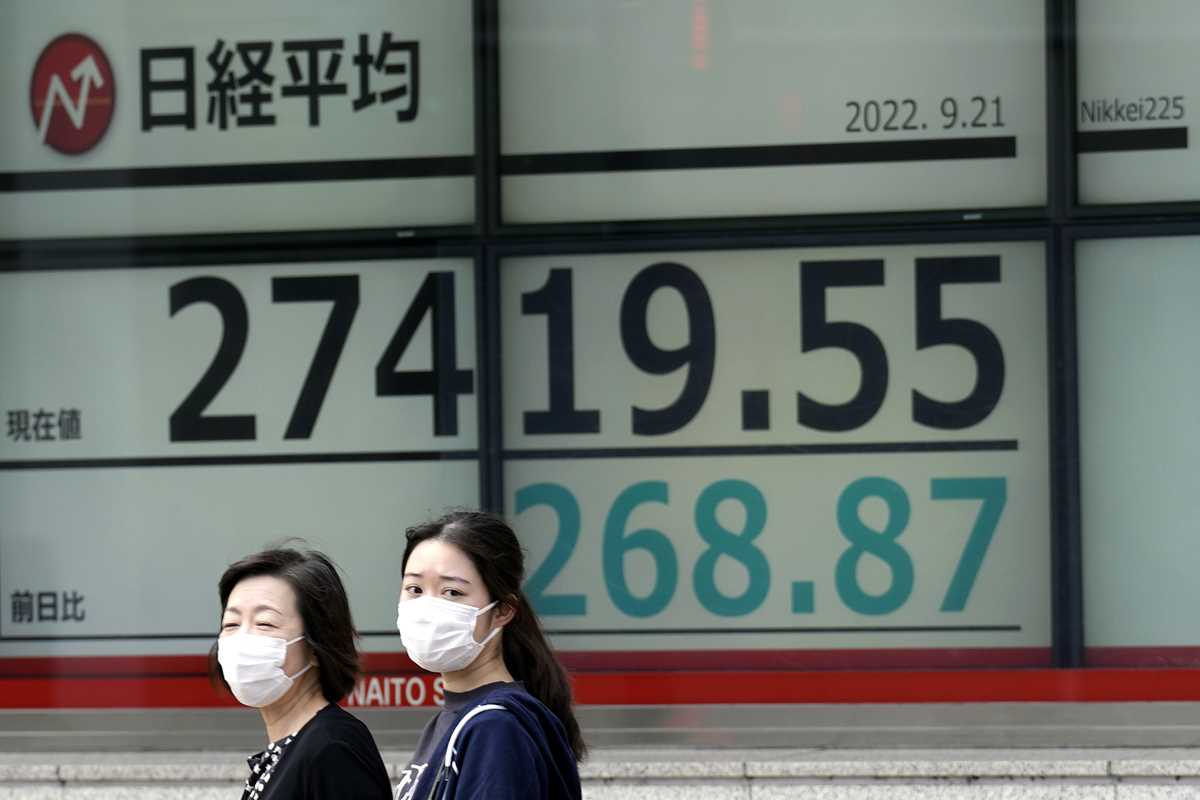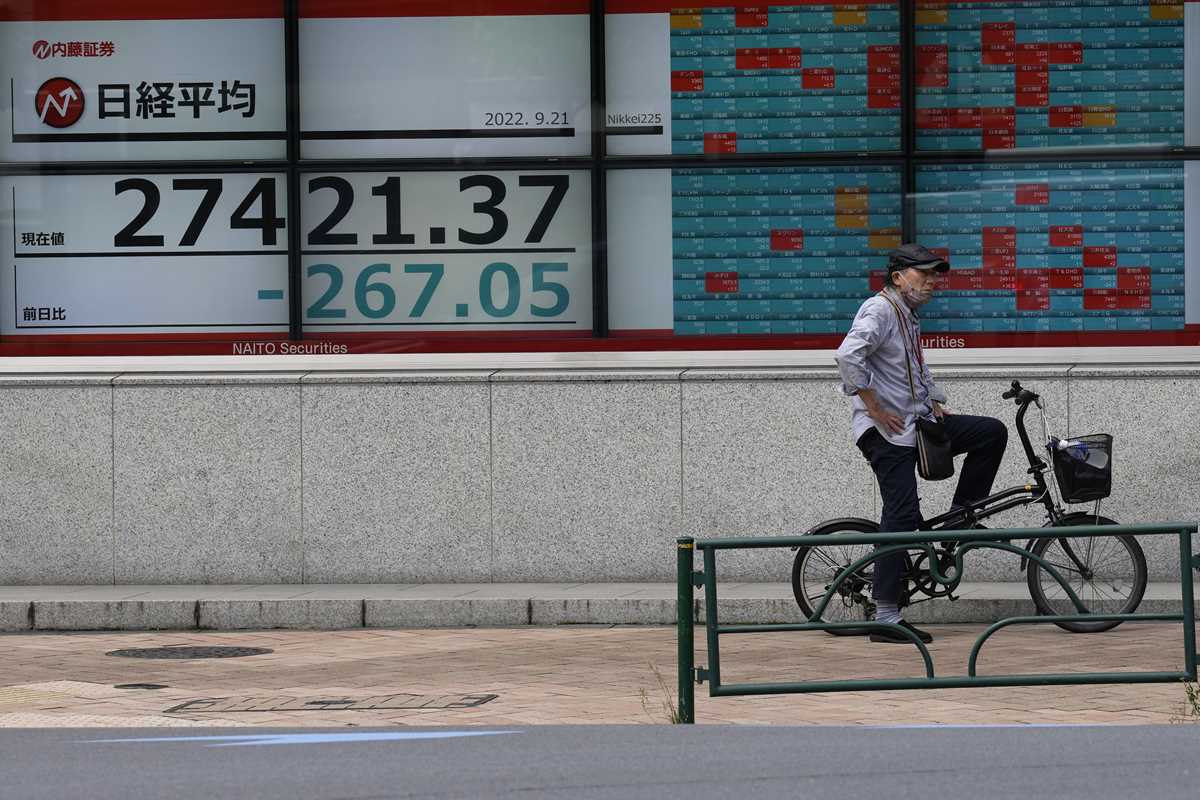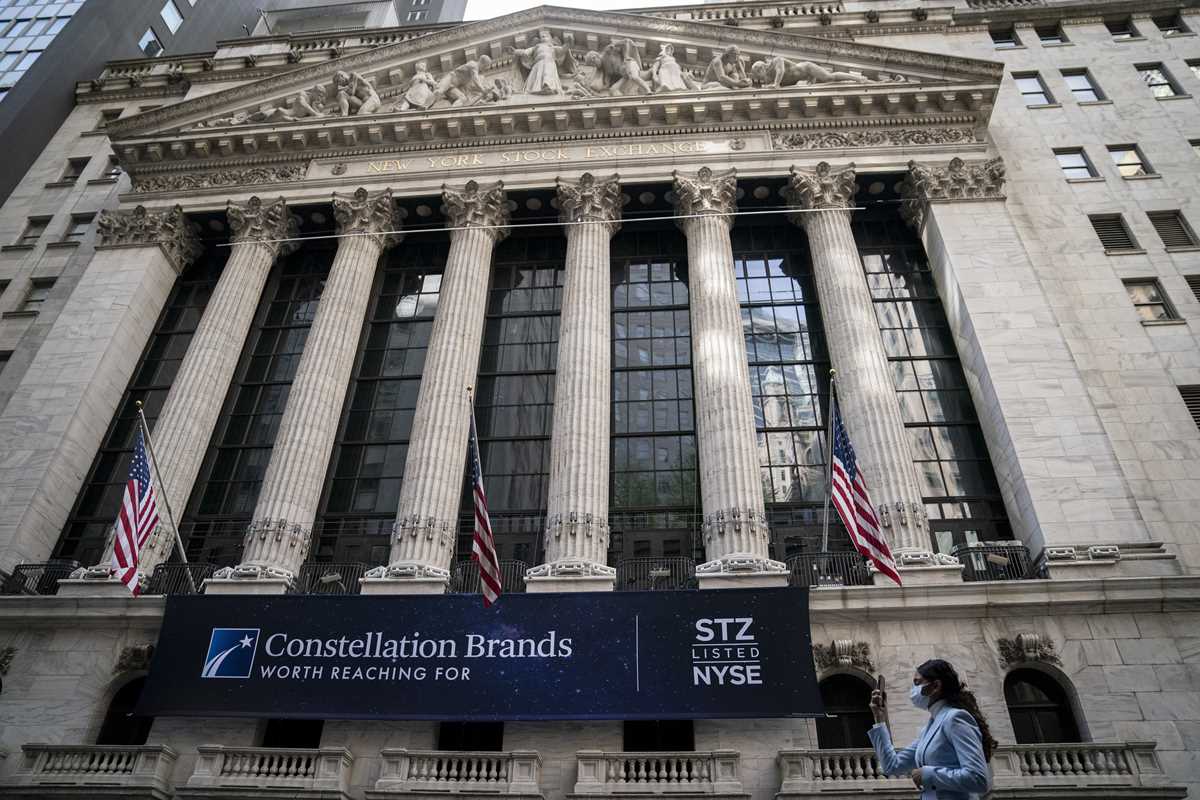 People wearing protective masks ride bicycle in front of an electronic stock board showing Japan's Nikkei 225 index at a securities firm Wednesday, Sept. 21, 2022, in Tokyo. Asian shares mostly declined Wednesday as investors looked ahead to a widely expected interest rate hike by the U.S. Federal Reserve in its bid to squash the highest inflation in decades.(AP Photo/Eugene Hoshiko)
People wearing protective masks ride bicycle in front of an electronic stock board showing Japan's Nikkei 225 index at a securities firm Wednesday, Sept. 21, 2022, in Tokyo. Asian shares mostly declined Wednesday as investors looked ahead to a widely expected interest rate hike by the U.S. Federal Reserve in its bid to squash the highest inflation in decades.(AP Photo/Eugene Hoshiko) People wearing protective masks walk in front of an electronic stock board showing Japan's Nikkei 225 index at a securities firm Wednesday, Sept. 21, 2022, in Tokyo. Asian shares mostly declined Wednesday as investors looked ahead to a widely expected interest rate hike by the U.S. Federal Reserve in its bid to squash the highest inflation in decades. (AP Photo/Eugene Hoshiko)
People wearing protective masks walk in front of an electronic stock board showing Japan's Nikkei 225 index at a securities firm Wednesday, Sept. 21, 2022, in Tokyo. Asian shares mostly declined Wednesday as investors looked ahead to a widely expected interest rate hike by the U.S. Federal Reserve in its bid to squash the highest inflation in decades. (AP Photo/Eugene Hoshiko) A person wearing a protective mask waits for traffic signal in front of an electronic stock board showing Japan's Nikkei 225 index at a securities firm Wednesday, Sept. 21, 2022, in Tokyo. Asian shares mostly declined Wednesday as investors looked ahead to a widely expected interest rate hike by the U.S. Federal Reserve in its bid to squash the highest inflation in decades.(AP Photo/Eugene Hoshiko)
A person wearing a protective mask waits for traffic signal in front of an electronic stock board showing Japan's Nikkei 225 index at a securities firm Wednesday, Sept. 21, 2022, in Tokyo. Asian shares mostly declined Wednesday as investors looked ahead to a widely expected interest rate hike by the U.S. Federal Reserve in its bid to squash the highest inflation in decades.(AP Photo/Eugene Hoshiko) Pedestrians pass the New York Stock Exchange, Thursday, May 5, 2022, in the Manhattan borough of New York. Stocks are opening broadly lower on Wall Street and Treasury yields are rising ahead of a key decision on interest rates by the Federal Reserve. The S&P 500 index was off 1.2% in the early going Tuesday, Sept. 20, 2022. (AP Photo/John Minchillo)
Pedestrians pass the New York Stock Exchange, Thursday, May 5, 2022, in the Manhattan borough of New York. Stocks are opening broadly lower on Wall Street and Treasury yields are rising ahead of a key decision on interest rates by the Federal Reserve. The S&P 500 index was off 1.2% in the early going Tuesday, Sept. 20, 2022. (AP Photo/John Minchillo)TOKYO (AP) — Asian shares mostly declined Wednesday as investors looked ahead to a widely expected interest rate hike by the U.S. Federal Reserve as it works to squash the highest inflation in decades.
Japan's benchmark Nikkei 225 dipped 1.4% to finish at 27,313.13. Australia's S&P/ASX 200 dropped 1.6% to 6,700.20. South Korea's Kospi lost 0.9% to 2,347.21. Hong Kong's Hang Seng shed 1.7% to 18,460.71, while the Shanghai Composite slipped 0.2% to 3,117.18.
Global tensions are adding to uncertainties. Russian-controlled regions of eastern and southern Ukraine have announced plans to start voting this week to become integral parts of Russia.
The Kremlin-backed efforts to swallow up four regions could set the stage for Moscow to escalate the war against Ukraine. Russian President Vladimir Putin recently blasted what he described as U.S. efforts to preserve its global domination and ordered officials to boost weapons production.
“Asian equities traded in a defensive mode on Wednesday. There were some geopolitical tensions concerning Russia and Ukraine, where the separatists are to hold a referendum in some regions, and traders were expecting an update from Putin,” Anderson Alves at ActivTrades said in a commentary.
On Wall Street, the S&P 500 index fell 1.1% on Tuesday to 3,855.93, as more than 90% of stocks and every sector in the benchmark index lost ground. The Dow Jones Industrial Average lost 1% to 30,706.23. The Nasdaq composite also fell 1%, to 11,425.05.
The selling came as traders waited to see how high the Fed will raise interest rates at its meeting that ends Wednesday.
Smaller company stocks fell more than the broader market. The Russell 2000 index gave up 1.4% to 1,787.50.
“The market is certainly bracing for the worst and you’re seeing a little bit of selling pressure coming in,” said Paul Kim, CEO of Simplify ETFs.
Bond yields mostly edged higher. The yield on the 10-year Treasury, which influences mortgage rates, rose to 3.56% from 3.52% from late Monday and is trading at its highest levels since 2011.
The yield on the 2-year Treasury, which tends to follow expectations for Fed action, held steady at 3.95%, hovering around its highest levels since 2007.
Stocks have been slumping and Treasury yields rising as the Fed raises the cost of borrowing money in hopes of slowing down the hottest inflation in four decades.
Fed Chair Jerome Powell bluntly warned in a speech last month that the rate hikes would “bring some pain.”
The Fed is expected to raise its key short-term rate by three-quarters of a point for the third time at its meeting on Wednesday. That would lift its benchmark rate, which affects many consumer and business loans, to a range of 3% to 3.25%, the highest level in 14 years, and up from zero at the start of the year.
Beyond that, investors will be focused on what Powell has to say, both in the Fed's latest interest rate policy statement and during an afternoon press conference, for clues as to whether the central bank remains primarily focused on lowering inflation, or if there's a hint the Fed is giving more consideration to the impact of higher rates on the economy.
Wall Street is worried that the rate hikes could go too far in slowing economic growth and push the economy into a recession.
The U.S. isn't alone in suffering from hot inflation or dealing with the impact of efforts to fight high prices.
The Bank of Japan began a two-day monetary policy meeting Wednesday, although analysts expect the central bank to stick to its easy monetary policy. Rate decisions from Norway, Switzerland and the Bank of England are next.
In energy trading, U.S. benchmark crude rose $1.95 to $85.89 a barrel in electronic trading on the New York Mercantile Exchange. It fell 1.5% Tuesday, weighing down energy stocks. Brent crude, the international standard, added $2.09 to $92.71 a barrel.
In currency trading, the U.S. dollar inched down to 143.53 Japanese yen from 143.74 yen. The euro fell to 99.64 cents from 99.73 cents.
___
Yuri Kageyama is on Twitter https://twitter.com/yurikageyama
Before you make your next trade, you'll want to hear this.
MarketBeat keeps track of Wall Street's top-rated and best performing research analysts and the stocks they recommend to their clients on a daily basis.
Our team has identified the five stocks that top analysts are quietly whispering to their clients to buy now before the broader market catches on... and none of the big name stocks were on the list.
They believe these five stocks are the five best companies for investors to buy now...
See The Five Stocks Here
Which stocks are likely to thrive in today's challenging market? Click the link below and we'll send you MarketBeat's list of ten stocks that will drive in any economic environment.
Get This Free Report